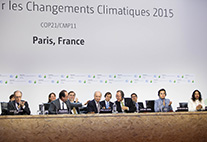KlimaCampus Hamburg: Paris Agreement is "spectacular"
16 December 2015, by CEN Universität Hamburg

Photo: UNFCCC/via Flickr/CC-BY 2.0
The Paris Agreement negotiated during COP21 represents a constructive shift in the international approach to addressing global change, evaluates the Klimacampus Hamburg.
The text lays down future measures for climate change mitigation that are coming close to comprehensive risk management. Given the urgency and seriousness of the challenge, it was agreed that future activities must focus on climate change adaptation as well as on emission reduction.
Major results are that the agreement (a) stabilizes expectations of long-term climate policy targets with the two-degree limit; (b) grants financial aid in the amount of at least US $100 billion per year from the Green Climate Fund starting in 2020 plus a granted increase from 2025 on; (c) obligates nations to report their climate protection plans and expected goals; (d) creates new tools and institutions for documenting climate protection measures, their implementation and expected results; (e) expressly acknowledges losses and damages due to climate change.
How to assess further results of the negotiations? The diminished discrepancy between the initially proclaimed temperature limit and the actual emissions reduction target is as welcome as the explicit mentioning of the remaining discrepancy. Its reduction is to be renegotiated in the future. As to commitment, however, no substantial progress has been achieved with the Paris Agreement. It is merely noted that the emission maximum shall be reached as soon as possible. Developing countries are reminded of their duty to meet this target, but are given more leeway.
By the same token, in order to reach net greenhouse gas neutrality—i.e., the balance between greenhouse gas sources and sinks—by the mid-21st century, the agreement specifically allows the use of insufficiently investigated and therefore controversial technologies such as geological CO2 storage (Carbon Capture Storage, CCS). More ambitious climate protection goals were rejected. The complete dismissal of carbon, oil, and gas called decarbonization, for instance, had been discussed in one of the Agreement’s drafts, but was excluded eventually. In the end, the resultant compromises are emblematic of the underlying logic of these complex negotiations.
The Pacific Island Countries had stipulated the wording that efforts are necessary to limit global warming to 1.5° Celsius (C). It was their basic condition for approving the agreement. Contrasted by the irrefutable two-degree limit, its vagueness is nonetheless justified, as a global warming limit of less than 1.5° C appears politically unrealistic. Prior climate protection efforts by the community of states were simply too feeble. Thus, the above claim may rather be understood as part of their need to be granted sufficient financial support for coping with unavoidable climate change repercussions.
Nonetheless the Paris Agreement is spectacular, but it will be worthless without subsequent action. All nation-states must ensure effective voluntary commitment to climate protection and change adaptation, the so-called Intended National Determined Contributions (INDC). Otherwise, the agreed aims, particularly the two-degree limit, cannot be achieved.
Against this backdrop, scientists will not be facing fewer challenges. The Paris deal contains plenty of cross-references emphasizing the current and prospective significance of basic research and continuous IPCC reports. It is explained that a special IPCC report on the impact of a 1.5° C warming must be published by 2018 already. Also, it is clarified unmistakably that any future decision must be based on the latest and best climate change expertise available.
Kontakt
KlimaCampus Hamburg coordination group
Dr. Bernd Brügge
Bundesamt für Seeschifffahrt und Hydrographie
bernd.bruegge"AT"bsh.de
Prof. Martin Claußen
Universität Hamburg
martin.claussen"AT"uni-hamburg.de
Prof. Hans von Storch
Helmholtz-Zentrum Geesthacht
hvonstorch"AT"web.de
KlimaCampus Hamburg
The KlimaCampus Hamburg is a network that brings together universities, research institutions and government authorities throughout greater Hamburg working on the issues of climate and climate change. Partners are:
- Bundesanstalt für Wasserbau
- Bundesamt für Seeschifffahrt und Hydrographie
- Centrum für Erdsystemforschung und Nachhaltigkeit, Universität Hamburg
- Climate Service Center Germany (GERICS)
- Deutsches Klimarechenzentrum
- HafenCity Universität
- Hamburgisches WeltWirtschaftsInstitut
- Institut für Friedensforschung und Sicherheitspolitik an der Universität Hamburg
- Institut für Küstenforschung, Helmholtz-Zentrum Geesthacht
- Max-Planck-Institut für Meteorologie
- Seewetteramt Hamburg des Deutschen Wetterdienstes
- Technische Universität Hamburg-Harburg
Accompaniment
- Behörde für Umwelt und Energie (BUE)
- Behörde für Wissenschaft, Forschung und Gleichstellung (BWFG)
